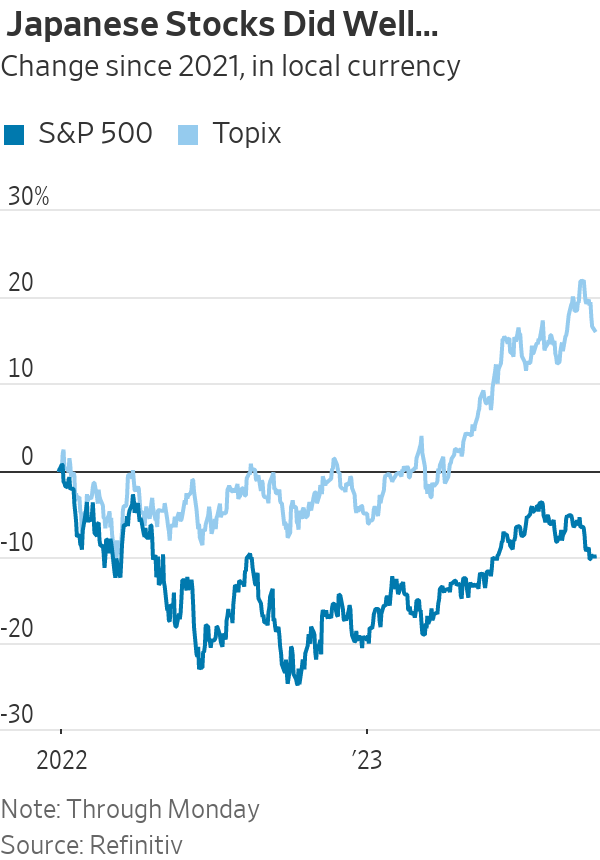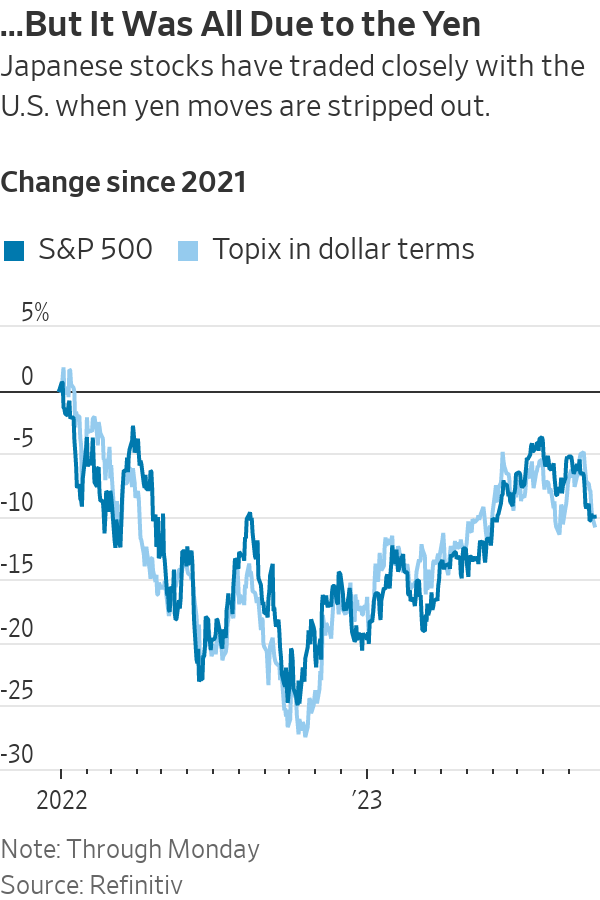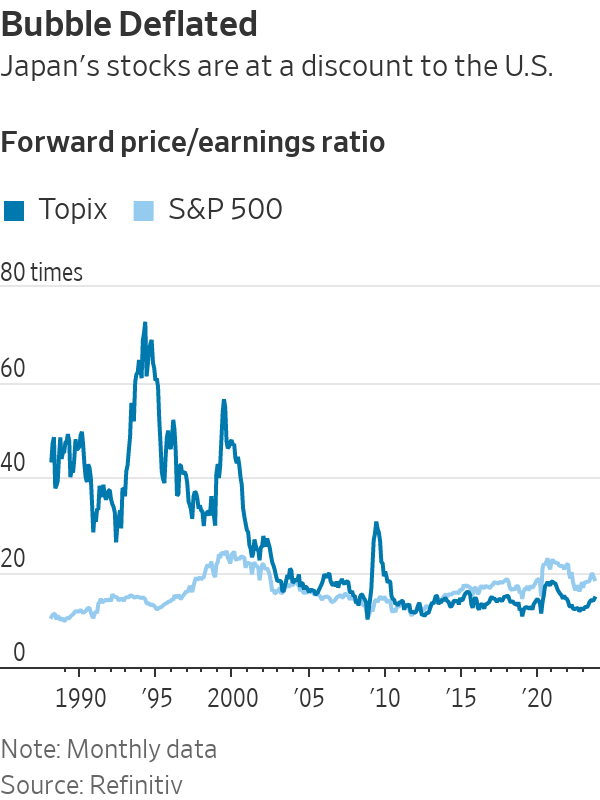Japan Is the Most Exciting Market in the World
Warren Buffett’s visit in the spring highlighted the value, and stocks are up 20% since March
There are conflicting stories to tell about investing in Japan at the moment, and annoyingly both appear to be correct.
The first is that the stock market is on fire, producing the best returns of any major developed country since the start of last year as foreigners wake up to the new shareholder-friendly approach of government, stock exchange and corporate boards.
Billionaire Warren Buffett’s visit and positive comments in the spring highlighted the value of venturing to the country, and stocks are up more than 20% since late March as foreign cash poured in.
The second is that all the work has been done by the collapsing yen, and in dollar terms Japanese stocks have performed almost exactly like the S&P 500.
I’m convinced by both stories, which is tricky. Under the first, I’ve long thought that Japan is shifting more toward market capitalism (even as the U.S. appears to be moving away from it).


The reform process that began with the third of the “three arrows” of Abenomics a decade ago is finally bearing fruit, as directors increasingly focus on profitability, run down cash piles and put investors first. There is still a long way to go (the barbarians remain mostly outside the gate) but buybacks, hostile takeovers and pushy investors getting their way are no longer impossible.
It isn’t just that the government, takeover panel and stock exchange are trying to create a friendly environment for shareholders. As Peter Tasker, co-founder and chief strategist of Arcus Investment, points out, they are pushing at an open door.
Companies overall have net cash, freeing them from the obligations to banks that made them focus on their lenders rather than their shareholders.
Incipient inflation—still supported by negative interest rates at the Bank of Japan—makes holding cash less attractive. The ageing population has created a permanent labor shortage. This makes layoffs politically easier since jettisoned workers can find new work quickly. And the desire of the U.S. and Europe to reduce dependence on China makes Japan’s manufacturing base and Pacific location attractive.
“I see a confluence of the incentives for investors put in place by the authorities and the position of Japan geopolitically as being very important, particularly as the yen is so cheap,” Tasker says.
The very cheapness of the yen is the problem, though. Since the start of last year, gains for Japanese stocks over and above the S&P have come only when the yen weakens—which it has done in high style. The currency is approaching 150 yen to the dollar again, worrying policy makers who intervened last year for the first time since 2011 to protect the level. This week, Finance Minister Shunichi Suzuki warned of possible intervention although insisted that it is sharp moves in the yen, not the currency’s level, that the government cares about.
It is natural that Japanese stocks should gain as the currency weakens, since the biggest are global companies such as Toyota Motor and Sony Group that earn much of their revenue overseas. The problem is that when the yen’s moves are stripped out, the Japanese market has matched the U.S. almost perfectly.
This makes it doubly hard to be bullish on Japan in the short run. If the currency strengthens, stocks should fall. And the currency is likely to strengthen if and when the central bank pulls back from super-easy policies in the face of rising inflation (core consumer prices are rising at the highest rate since 1992, before deflation set in).
Worse, it’s really hard to see why Japanese stocks have performed like the S&P, given the huge differences between the two markets. Investors shouldn’t invest in things they don’t understand, and the tight link between the performance of the broadly diversified Japanese market and the tech-dominated, top-heavy S&P is a puzzle.
Maybe it is driven by index and futures traders throwing billions around while ignoring individual stocks, thus creating great opportunities for stock pickers. But this is impossible to prove, and the alternative theory is blind luck, not a great basis for an investment.
One twist to my concerns is that perhaps it’s good that Japan has only matched the U.S. for the past couple of years, because it means many investors haven’t yet bought into the idea that Japan is fixing its stock market. For those of us who think there is a long-lasting change under way in Japan, that means there is still plenty of buyers out there who will eventually join in.

That shows up in stock valuations. Tasker calculates that almost half the benchmark Topix index trades at less than book value, while the index has a forward price/earnings ratio of 14 times, against 18 for the S&P.
True, it’s no longer the screaming bargain it was at below 11 times before Abenomics began, or around 12 earlier this year when Buffett visited Tokyo and said he might increase already-hefty holdings in the country’s trading houses (which have all outperformed the broader market since). But it is at least much cheaper than the U.S.
Japan has plenty of long-run economic challenges, not least a huge government debt load and among the world’s worst demographics, as well as a reliance on central-bank financing. The puzzling link between its stock market and the S&P gives me pause for thought, too.
But for the medium to long run, so long as macroeconomic disaster is averted, the shift toward market capitalism ought to lead to better-run companies that are worth more.
 Copyright 2020, Dow Jones & Company, Inc. All Rights Reserved Worldwide. LEARN MORE
Copyright 2020, Dow Jones & Company, Inc. All Rights Reserved Worldwide. LEARN MORE
This stylish family home combines a classic palette and finishes with a flexible floorplan
Just 55 minutes from Sydney, make this your creative getaway located in the majestic Hawkesbury region.
More than one fifth of Australians are cutting back on the number of people they socialise with
Australian social circles are shrinking as more people look for ways to keep a lid on spending, a new survey has found.
New research from Finder found more than one fifth of respondents had dropped a friend or reduced their social circle because they were unable to afford the same levels of social activity. The survey questioned 1,041 people about how increasing concerns about affordability were affecting their social lives. The results showed 6 percent had cut ties with a friend, 16 percent were going out with fewer people and 26 percent were going to fewer events.
Expensive events such as hens’ parties and weddings were among the activities people were looking to avoid, indicating younger people were those most feeling the brunt of cost of living pressures. According to Canstar, the average cost of a wedding in NSW was between $37,108 to $41,245 and marginally lower in Victoria at $36, 358 to $37,430.
But not all age groups are curbing their social circle. While the survey found that 10 percent of Gen Z respondents had cut off a friend, only 2 percent of Baby Boomers had done similar.
Money expert at Finder, Rebecca Pike, said many had no choice but to prioritise necessities like bills over discretionary activities.
“Unfortunately, for some, social activities have become a luxury they can no longer afford,” she said.
This stylish family home combines a classic palette and finishes with a flexible floorplan
Just 55 minutes from Sydney, make this your creative getaway located in the majestic Hawkesbury region.






















